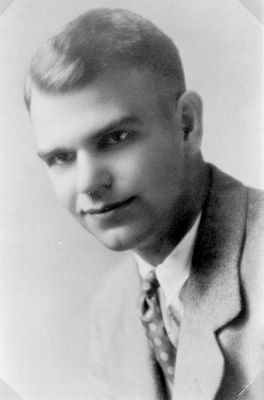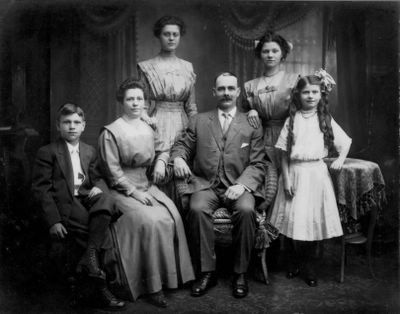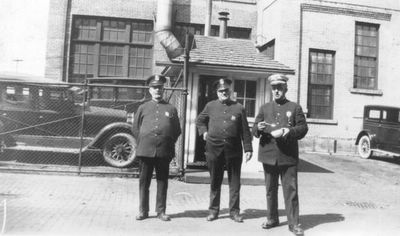
Grandpa Gord as a young man
Grandpa Gord was born in November of 1899 in Ishpeming, in the upper Peninsula of Michigan to William Rowe Harry and Sarah Louise Hawes, immigrants from Cornwall, England. He was their first and only son; sisters Myrtle and Olive were 6 and 4 years older than Gord. Many people were coming over from Cornwall then, as the Cornish were known for their expertise in the mining of shallow ore deposits.
Although the mining company had paid their passage to America in 1889, William and his ancestors had worked on estates as butlers, gardeners, farm laborers, etc. William told stories (passed on by Gord) about the “Duke” of St Albans and the hunting parties for his well-to-do guests. Local kids were hired to flush pheasants for the visitors, or “poachers” would use ferrets to run rabbits out of their dens. (This theme of hunting as a gentleman’s sport is echoed in family photos from the 1920’s and 30’s that show men in three piece suits and fedoras posing with their hanging bucks. What a treat it must have been for William to move to a place where he could be the gentleman with the gun instead of the kid beating the bushes.)
The Harry and Hawes families were acquainted back in Cornwall (William once worked delivering coal to the Hawes’ neighborhood), and eventually most of the members of both families were reunited in Michigan. William traveled to this country with his friend Henry J. Ivey. They boarded in the Hawes home at Ishpeming and each married a Hawes daughter. The 1900 census shows William and Louisa, both able to read and write English, married and living in Ishpeming.
The Hawes family had more of a mining background. My uncle Bryan writes: “Gordon said his Grandfather Hawes had a homestead on the road past the Rope Gold Mine near Ishpeming. Its ‘lower 40’ is now covered by Dead River Reservoir. Grandfather Hawes left Cornwall when the mines gave out. He brought a large family to Ishpeming, but traveled widely from there---to Grass Valley, CA, to Africa three times. He worked on the Cape to Cairo Railroad (‘he was a railroad man, not a miner’). Once in Africa he ‘had three helpers who were Hottentots;’ if the train hit and ‘killed an elephant they stopped until they ate it.’ When Grandfather went to Africa, he signed three year contracts.’” Bryan continues: “I remember in the late ‘50’s my dad discovered a rifle displayed over a bar in Lander, Wyoming that had belonged to Grandfather William Hawes. (The bar owner noticed Dad’s Michigan plates and said he ’knew a Seymour Hawes of Detroit—that’s his dad’s rifle’). The bar owner wouldn’t part with it. Not much was said about son’s Willie and Jack’s entry into the U.S. They’d been in the British Navy but jumped ship at New York City and came to Ishpeming.”
It was boom times in the UP. Another daughter, Eveline, was born in 1901. William and Louisa relocated their family to Painesdale, MI, probably in 1902 when the Champion mine came into full production. It must have been a lot like a lumber camp in those first years. Grandpa talked of stocking up for the winter because there would be no supplies until the ships came back through Lake Superior in the spring. He learned habits of self-sufficiency from these early years—if you wanted to eat something, you’d better be able to grow it, kill it, and cook it. If something broke, you figured out how to fix it. Louisa was scared to death of the wolves howling in the woods at night but Gordon learned to love the woods and would be an avid hunter for the rest of his life. There was one church and a number of traveling clergymen. The people would all come and hear whatever denomination (or native tongue) was giving the service that week. For a kid raised in a small, remote village, Gordon was remarkably at ease with people from all walks of life. This trait that was probably acquired back in the early days of Painesdale.

The Harry family in Painesdale
Progress came quickly to Painesdale. The mine was owned by William Paine of Boston (founder of Paine-Webber). Mr. Paine played a key role in the development of the paternalistic communities of the South Range. He personally saw to the creation of hospitals, schools, stores, entertainment, land for churches, libraries. Painesdale was the hub of the series of communities built around the various mines. In 1909 a water system was installed throughout Painesdale. Electricity and a phone system followed. The Sarah Sargent Paine Library, named after Mr. Paine’s mother, was located in Painesdale. Grandpa told me many times about the portrait of Mrs. Paine, painted by John Singer-Sargent, that hung in the main room of the library. The high school was also located in Painesdale, and Grandpa was proud of receiving an education as good as any eastern boarding school. His high school even had an indoor swimming pool! By 1909 the high school had 400 students, many of them commuting by train from other mining towns. Painesdale was on the main line of the Copper Range Railroad, heading north to Houghton-Hancock and south to a connection to Chicago.
In the 1910 census, William was listed as a butcher in a meat market and owned his home free of mortgage. This was where Gordon and his family lived until he graduated from high school. At the start of World War I, Gord was working at the mine, as a student helper at $30/month making metallurgical tests in the master mechanic’s office. The master mechanic, a MSU graduate, was called up to serve in the army and Gord took over his job, essentially running the mine, armed only with his high school education and a textbook the guy had left behind. Grandpa told me this story many time as a testament to what can be done with a good book and a sharp mind. His faith in literacy was life long. When he was in his eighties he could still read three books in two days and suddenly be well versed in a topic that he had never considered before.
It was not all great times. Gordon’s oldest sister Myrtle died in the fall of 1915 at age 21 of a “sudden fever”, probably meningitis. Around this time the most easily accessible of the copper was starting to play out. Strikes were breaking out at the mines. The price of copper was bolstered by World War I, but when the war ended in 1918 it crashed. After Gordon graduated from high school in 1917 he enrolled in the University of Michigan and his whole family moved south.

Guards at the Chevy plant, left to right: William Rowe Harry, Willie Hawes, Henry Ivey
His dad and Henry Ivey got jobs as guards in the Buick plant in Flint. Gordon graduated from U of M in 1923 with a BS in Mechanical Engineering. By 1925 he was working at the AC Division of General Motors. He was active in community affairs in Flint, including serving as Treasurer of the Warner School when the new teacher came by train from the SE Missouri State Teacher’s College.
The Rest is History…..
This bio is based on conversations with Grandpa, supported by Bryan Harry’s genealogy research and notes on family lore. Background information on the copper range came from:
http://www.portup.com/copperrange/index.htm
originally posted on Leelanau.com

No comments:
Post a Comment